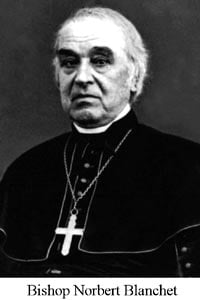
In 1837, Bishop J. Signay appointed him vicar general of the district of Quebec with jurisdiction over the missions of Oregon where he arrived in November of 1838 accompanied by Abbé Modeste Demers. On December 1, 1843, Pius IX made the Oregon territory into an apostolic vicariate and conferred the administration of this territory on Norbert Blanchet who was consecrated bishop in Montreal on July 25, 1845. He then made a trip to Europe to recruit priests and obtained from the Propaganda the creation of an ecclesiastical province. Bishop Norbert was appointed archbishop of Oregon City with two suffragan bishops: Magloire Blanchet, the bishop of Walla Walla and Modeste Demers, the bishop of Vancouver Island. He was zealous in carrying out his administrative tasks and resigned in December of 1880. His diocese boasted 23 priests, 22 churches and a population of about 20,000 faithful He died on June 18, 1883 and was buried in St. Paul’s cemetery in the valley of the Willamette.
Bishop Norbert Blanchet passed through Marseilles at the beginning of 1846 and asked Bishop de Mazenod for missionaries. The latter, on February 21, 1846, wrote to Father Pierre Aubert in St. Boniface: “It was doubtless very tempting but we find it impossible to extend ourselves beyond your mission which is already so remote and so difficult to supply.” (Oblate Writing I, Vol. I, No. 61) The Oblates were sent to Walla Walla in 1847 and had little contact with the archbishop. In 1848, Father Pascal Ricard, the superior of the Oblates, did, however, establish the main house of the congregation at St. Joseph of Olympia, which, at the time, was under the jurisdiction of Bishop Norbert Blanchet and they received a few novices there.
In 1851, Bishop de Mazenod complained to the Propaganda about Bishop Norbert who was opposed to his priests embracing a vacation as religious: “Just think that this “holy” man, that is not to say “gentleman” Archbishop, has threatened one of our religious, professed for one or two years, with suspensio etiam a sacris if he does not quit his community and return to him.” (Oblate Writings I, Vol. V, No. 20) Father François Jayol remained an Oblate, but Abbé Leclaire was obliged to leave the novitiate. (Oblate Writings I, vol. V, No. 24)
Father Ricard and the Oblates had dealings especially with Bishop Magloire, the bishop of Walla Walla and subsequently bishop of Nesqually and he complained of the authoritarianism of this individual. In his correspondence, Bishop de Mazenod speaks almost invariably of “the Blanchet brothers” whose zeal he recognizes, but who describes them as “headstrong men before whom everyone must bow,” “who have showed themselves so unwise in their administration,” “blessed gentlemen,” with whom it is not easy to come to any agreement because of their character which is “a little difficult to endure.”
Yvon Beaudoin, o.m.i.
